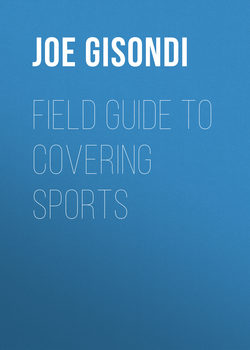Читать книгу Field Guide to Covering Sports - Joe Gisondi - Страница 35
На сайте Литреса книга снята с продажи.
Prepare
ОглавлениеA sports fan who goes to an event can simply relax and have a good time. A journalist can’t. Being a sports journalist is its own kind of fun, but nobody would call it relaxing. You need preparation to understand what you’re seeing in a game and preparation to do a good interview. Read press guides, evaluate statistics, and interview people familiar with the team, such as team managers, statisticians, and physical trainers.
At first, keep your notebook closed and your ears and eyes open. If you are assigned to cover a game at the last minute, you can still try to read some stories and review team stats. Great questions come from sweat and hard work.
Prepare not just yourself but the people you interview. People like to know why they’re answering questions. Tell sources right away what you’re looking for—for example, “I noticed X during the game, and I wanted to ask about it.” This kind of statement eases the person’s concerns (“Oh, no problem, I know how to talk about that”) and lets the interviewee start thinking about the topic, which means better responses and more information for your story.
Finally, of course, preparation means anticipating possible story angles, something you can do only by researching people and subjects. Interviewing is like a tennis volley, where the journalist serves up questions, the interviewee answers, and the journalist responds by lobbing another question. Without a game plan, you’ll be able to ask superficial questions that yield general responses not worth repeating. Before any interview, learn as much about a person or subject as possible and prepare a list of specific questions. But remain open to new, surprising responses; be ready to scrap the pregame plan. It’s easy to miss something unique that your interviewee has said, because you’re busy listening for the things you expected to hear.
